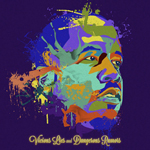Norah Jones “…Little Broken Hearts” Blue Note
- Performance:

- Sound:

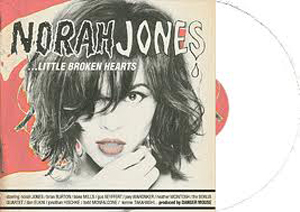
A buddy of mine whose taste I trust was freaking out about the newest Norah Jones album a while back. It’s called …Little Broken Hearts, and I thought for a while that the only version available was the $50 variety through Analogue Productions. I was wrong about that as Norah’s label, Blue Note, offers a more pedestrian version on double white vinyl cut at 33rpm (while AP’s is at 45). I’m mostly unfamiliar with her work, but I loved her tune on the Rome album where she collaborated with Danger Mouse. I’m willing to at least investigate everything that he stamps his name with now so it wasn’t that much of a stretch to throw …LBH in the cart. I’m glad I did, and I’m pretty comfortable announcing that at this point. Here goes…
I’d already put a toe in the water with these tunes when I picked up the …LBH remix EP for Record Store Day last month. So I wasn’t entirely caught off guard. The formula is a simple one and is probably more commonly used than I’m aware of. Here’s how I hear it: you take a young lady with a lilting voice and place her narcotic-simulating-melodies over instrumentation both organic and electronic. Turn everything down and throw the distortion pedal in the crosswalk. Throw in a little tremolo here and there, and serve at room temperature. I get a feel from this one that is similar to the one I get while listening to Jessica Lea Mayfield’s Tell Me. Which is similar to the one I used to get by ingesting certain chemicals. These are, of course, blanket statements. Mayfield doesn’t make as much use of the electronica and leans a little more heavily on the tremolo. Jones actually does make use of some distortion (“Take It Back”), but it’s still pretty quiet. That part of the blanket is intact. The folks that bought this as an impulse buy at the Starbucks counter are in for a surprise. Maybe. I’d certainly never heard Jones in this light before. I like the acoustic juxtaposition with the manufactured sounds. Always have. And the songs are pretty special too. “After The Fall” has particular staying power, but not because of some over the top instrumental hook or anything. It’s power comes more from the sound layers and Jones’ vocal melodies. If I didn’t know that she recorded this in Danger Mouse’s L.A. studio, I might think she’d recorded her parts while lying in a warm bath, her servant giving her a foot massage. The servant would be male. And buff. And totally whipped. There’s an end of romance thread through the whole thing that I haven’t quite sunk my teeth into yet. Maybe I’m afraid. No one wants a broken heart, no matter how little.
I don’t see any need to upgrade to the $50 version of this record although the music may lend itself to an audiophile presentation. My copy is plenty quiet, comes in a gatefold sleeve with a giant poster of the cover art (which was inspired by the poster for a Russ Meyer movie). For the true believers, I’d say spring for the AP version especially if you need it to complete your collection (they’ve reissued Jones’ entire catalog). For folks like me who are looking to change things up for a minute before more rocking ensues, I’d say Blue Note’s version is good enough.
(This album was purchased at MusicDirect.com.)
Jack White “Jack White Live At Third Man Records” Third Man Records
- Performance:

- Sound:

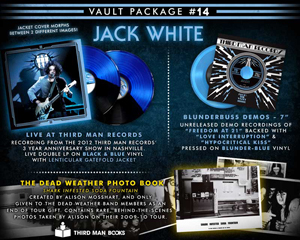
I walked into Jack White’s Third Man record store in Nashville a few years ago for the first time and was drawn immediately to a vinyl copy of Icky Thump on the wall. In mono. How had I missed this? I put my credit card on the counter and, foolishly as it turns out, told the girl behind the register that I wanted to buy it. But I wasn’t in any way cool enough at the time to have that record in my collection. It’s a wonder she didn’t laugh me out of the store. I was not, you understand, a member of The Vault. This is a record club that Big Jack started up a while back. For $60 quarterly, you get a full-length vinyl release, a 7″ of some description, and some sort of ephemera beyond that (t-shirt, book, DVD, whatever). The nature of the package is kept under lock and key (presumably in the vault itself which is likely painted yellow and black) until close to the release date. Third Man presses the records only for the subscribers and sends them out by mail come go time. They show up on EBay the next day for hundreds if not thousands. Rinse and repeat. You have to give 30 days in advance of cancellation so there’s no way to see what the package will look like before opting out. You also get exclusive access to all sorts of video and web content online, but I’ve not explored much of that. Maybe I should. $60 is not chump change when it comes to this sort of thing. I finally opted in for the latest installment after having missed packages designed around the White Stripes, the Greenhornes, and Wanda Jackson amongst others. This one is designed around The Gentleman Himself. Jack White Live At Third Man Records is the full-length. Best $60 I’ve ever spent, by golly.
This one was recorded on March 8, 2012 with Jack’s girl band (The Peacocks) backing him up on the first disc and the dudes (The Buzzards) on disc two. Both discs are pressed with split colors (black and blue) on each. The gatefold cover features a creative image of Big Jack that changes depending on the angle it’s viewed from. The recordings themselves are pretty “boot leggy” in the best sense of the (admittedly just invented) word. There’s not a ton of bottom end which is not surprising considering the man made his name in a band sans bassist. The recordings feel appropriately intimate as they were made in front of a small audience at the store’s third anniversary shindig. The set list is stellar and includes material from all of Big Jack’s bands that I am aware of (Stripes, Dead Weather, Racounteurs, and solo). There are glitches and it’s hard to tell if they are in the recording or if they were captured live. They are endearing more than disconcerting. But I’m biased. I feel like Big Jack is one of the more creative pop artists working and conveys so much respect for the process of creating that I tend to fall for whatever he offers me.
The 7″ on this set includes demos of songs that wound up on Blunderbuss and the other item is a photography book that Alison Mosshart made during a Dead Weather tour for her bandmates. I’m a subscriber and I’m a believer. It’s nice to be this cool. I can’t wait to see what’s next…
The Beatles “Past Masters” EMI Records
- Performance:

- Sound:

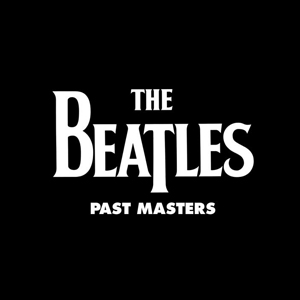
My excitement at the prospect of the new Beatles reissues was tempered significantly when I learned that the albums all underwent some type of digitalization en route to the final product. Why is that? Was it a financial concern? Too hard to get Yoko on board with Paul’s vision? Laziness? (Did they just transfer the work they’d done for the CD reissues onto a slab of vinyl & call it a day?) I have not one original Beatles Parlophone release to compare the reissues to. But there never was an original vinyl version of Past Masters so I thought I’d start there. I learned a lot.
The original Past Masters were on CDs and were split up as Volume One and Volume Two. Here, they’re offered as a complete double album set. And it’s a cool little artifact right out of the wrapper. The packaging feels sturdy if not classic. The records are housed in a gatefold package with high quality inner sleeves. The first disc’s inner is white while the second’s is black presumably as a nod to the CDs of yore. Volume One had a white motif while Two was black. Neat. But that’s not why we came here.
On first listen, I realized right away that the folks in charge of this project hadn’t made an attempt to match the sonic feel of the original releases. They took liberties, and examples are everywhere. The tambourine in “Day Tripper” seems much more prevalent than I’ve ever heard it before. There’s a general increase in overall clarity, I guess, but I’m not convinced that it’s an improvement. Perhaps I’m just scared of the unfamiliar. And I’m nothing if not “familiar” with the work. The original recordings had that glorious ’60’s haze floating out of the grooves, providing a buffer between the listener and the blinding genius of the musicianship involved. Here, you get more separation and sharpness than you’ve had in the past, but the effect doesn’t equate to more realism. It equates, for me anyway, to that little bit of discomfort that I mentioned already. I guess what I mean is that this reissue might technically sound “better,” but it doesn’t make for a “better” listening experience. It certainly makes for an interesting one. Fanatics will be given every opportunity to pore over these grooves and luxuriate in the presence of an acoustic guitar that they may never have heard so well (“Paperback Writer”). In this way, one can study the individual contributions of the players with more accuracy, but which version will one prefer? As a more casual fan, I can certainly appreciate both, but I’ll probably always prefer the originals. The material, of course, cannot be questioned. I’ve always been a fan primarily of the group’s later work, after their conversation with Dylan in that car. So I spend most of my time on the second disc, much of which is comprised of the Hey Jude record which is absolutely classic by definition. And having a mint vinyl version of any record containing “Don’t Let Me Down” is worth looking into.
I’m glad to have Past Masters and I suspect that the sentiment will increase over time as I become more acclimated to the changes that were wrought here. While I’m not going to beat my retailer’s door down to buy up all the rest of these reissues, I may be inspired to resume my hunt for some tasty originals. And I’m still looking forward to the mono sets rumored for 2013. Who isn’t?
(This album was purchased at MusicDirect.com.)
The Coup “Sorry To Bother You” Anti-
- Performance:

- Sound:

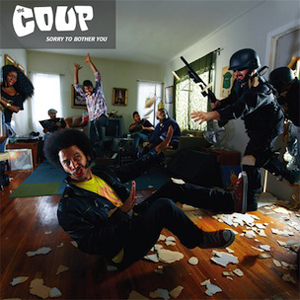
Somehow, I missed hearing about The Coup’s latest full-length release, Sorry To Bother You. I try my best to keep up with the group, but they’re a bit slippery and are certainly not as prolific as I’d like. They’re last release was from about six years back, and I doubt that I’ve heard a better hip-hop record since. Boots Riley always has an agenda for his crew and Bother is no different. Alright. I read some from the lyrics sheet in an attempt to discern a theme or concept, but I was unsuccessful. And I’m fine with that. I, like most folks, haven’t done much to improve my attention span over the previous decade, but I know when my ears hear something worth hearing. And Sorry To Bother You is so much more than “worth hearing.” It’s a party. It’s a rocker. It’s… a soundtrack to a forthcoming movie inspired by Riley’s time as a telemarketer. So be it. I’m just glad I found it.
The Coup put this one together with all live instrumentation. No samples and precious little turntable work. In fact, Pam the Funkstress is credited with scratching only on “Land of 7 Billion Dances,” but I can’t tell that she does any scratching at all. She does a bunch of hand clapping though. Lots of folks do. It’s an integrated part of the sound. The guitar is plentiful and the keyboard sounds are rampant. There are also kazoos (“Your Parents’ Cocaine”), washboards, accordions, French horns, and string sections (“Violet”). Vernon Reid makes an appearance on guitar (“The Gods of Science”) as does Eric McFadden (“The Magic Clap”). The vibe is equal parts Outkast (both the fun and heavy versions), Weezer, Parliament, and Herbie Hancock’s Headhunters (whose album cover is visible in the cover art). Boots is as angry as ever, but his presentation is different. He’s faster, but no less articulate. The eclectic nature of the songs gives him a huge canvas to work with and he makes use of every bit of it. It’s a busy record that pulls in a million different directions, but somehow it coheres, and Riley is in control throughout. He slips his message (the medicine) in with a spoonful of sugar (the sounds) in such slick ways that one may not notice that they’re singing along to a politically charged diatribe aimed at overthrowing the (any?) government. Riley has aligned himself with Tom Morello so he’s raging against the machine with the big boys these days, and making it sound so fun. I’m not sure that it’s my favorite album by the Coup, but it’s my favorite hip-hop record since the Coup’s last one. If the Clash was supposed to be “the last important rock band,” then the Coup may be the only important band working today at all. At least on this level. And that level’s not big enough. Or I’d have known this record was coming from six months out.
Sorry To Bother You is pressed on two standard weight discs at 45rpm. There’s lots of bottom end and the records themselves are super quiet overall. Thankfully, the lyrics are printed on the paper inner sleeves which you’ll want to replace ASAP with proper inners. There’s a CD included as well. The set has a distinct Indy feel to it, but distribution shouldn’t be an issue as it’s on the Anti- label. This one’s on lots of year end “best of” lists, and rightfully so. I’m glad I stumbled across it.
Muddy Waters / The Rolling Stones “Live At The Checkerboard Lounge, Chicago 1981” Promotone BV/Eagle Vision
- Performance:

- Sound:

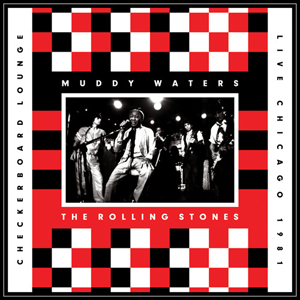
The Stones juked me on my Record Store Day 7″ with a defective disc for which they charged me $10. And that’s about $700 less than they charged my buddy to sit in the second level of a Brooklyn arena to watch them play live as part of their 50th Anniversary. But we keep coming back, don’t we? Their second “vault” release is a collaborative effort between the Stones and Muddy Waters. I’d seen some footage from the show, but never the whole shooting match until Live At The Checkerboard Lounge, Chicago 1981. It’s an interesting document if not an essential one. Warts and all, my record collection is better with it than without it. Every time I try to get out, they drag me back in…
This starts as a Muddy album and ends as… something else. Muddy was performing while seated on a stool at this stage of the game, and he commands more attention than Mick Jagger can with all of his flitting around and mugging. (Win some, lose some. Jagger ate Michael Jackson’s lunch on that tune they did together a few years later. Live to fight another day, lads.) In fact, I find Jagger to be more disruptive than anything else here. Superfluous, at best. Keith and Ronnie are another story entirely. The program goes something like this: Muddy’s band plays a couple of warm-up numbers without their boss around. Muddy takes the stage and commences straight away to playing his red Telecaster like it’s a child’s toy, slashing and cutting slide solos all around. The Stones contingent enters the building and completely disrupt and distract from everything that the Master is doing onstage. Bottles of liquor are brought to their table by a Checkerboard employee in hair rollers. The Master calls Jagger up first, then Keith, then Ronnie. The apprentices take a couple of numbers to find their groove within the band, then things start cooking. Richards and Woody start weaving their musical tapestry at the foot of their hero. Then, things get crowded. Then, crazy. At various times and all at once, Buddy Guy, Junior Wells, and Lefty Dizz stamp themselves into the historical record with varying degrees of efficacy. Junior Wells could have stayed his drunk ass home and would not have been missed. Buddy Guy plays a couple of stellar solos and a couple of sloppy ones. Lefty Dizz plays with more character than perhaps anyone else involved, but may have overstayed his welcome as a vocalist. Versus are repeated, sometimes consecutively. Solos are played over straining vocalists, and endings are missed and/or invented on the spot. By the time Muddy comes back on stage, the inmates are running the asylum and there’s not much more work to be done. They close with “Champagne and Reefer,” and whiskey, and God knows what else.
The first disc in this set is on white vinyl, the second is black which is in keeping with the Checkerboard motif. They sound fuller and richer than the accompanying DVD. Just like the recent live Some Girls set, there’s a ton of real estate wasted in this triple gatefold presentation. No essays and minimal photography although the event was rife for both. Again, I’d rather have Checkerboard than not, but there are some missed opportunities here. I can’t tell that the Stones care much at this point. Get arrested, get rich, get knighted, get richer. Get complacent? Get a clue. Get a real fan’s perspective to help these vault releases achieve their potential. That’s my advice.
(This album was purchased at MusicDirect.com.)


